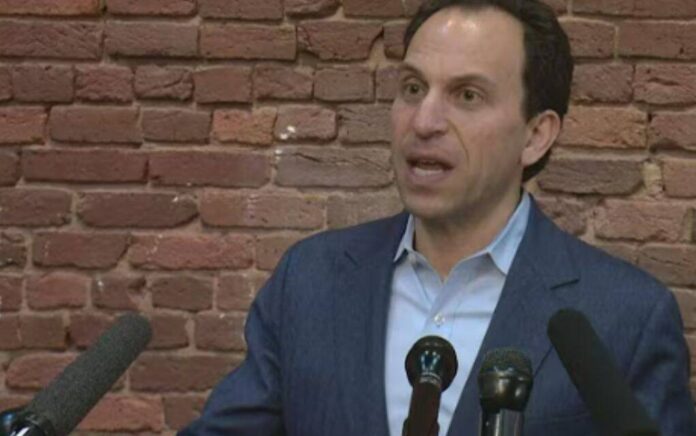
Donald Trump won’t backdown. He will defend the rule of law.
That’s why a major Democrat-controlled city has bent the knee to Trump’s demands.
Louisville Shifts Away from Sanctuary City Status Under Federal Pressure
A prominent U.S. city is revising its immigration policies in response to intensified demands from the Trump administration. Louisville, Kentucky, will now comply with Immigration and Customs Enforcement (ICE) requests to hold detained individuals for 48 hours, effectively removing itself from the list of sanctuary cities, as announced by Democratic Mayor Craig Greenberg. The decision follows increased immigration enforcement actions and a warning from the Department of Justice that the city’s prior stance violated federal regulations.
“I have been assured by the U.S. Department of Justice that, if we reinstate the 48-hour detainers for inmates who’ve been arrested for crimes, Louisville will be taken off the federal sanctuary city list,” Greenberg stated in a Tuesday press release.
The mayor emphasized the urgency of the change, noting, “Accordingly, Metro Corrections will begin honoring 48-hour federal detainers as soon as practical because the stakes are too high. In turn, Louisville will no longer be considered a ‘sanctuary city’ by the federal government.”
The term “sanctuary city” typically refers to jurisdictions that limit cooperation with federal immigration authorities, often by refusing to honor detainer requests, sharing information with ICE, or notifying the agency about the release of undocumented immigrants. When local authorities detain an undocumented individual for criminal charges, their details are entered into a national database, alerting ICE. A detainer request asks local jails to hold the individual for up to 48 hours, allowing ICE to take custody before release.
Louisville’s Metro Corrections had followed this 48-hour detainer practice until 2017, aligning with the standard set by Kentucky’s Department of Corrections. Greenberg cited fears of intensified ICE raids and the potential loss of significant federal funding as key reasons for reinstating the policy.
“This change in designation is critical,” the Democrat said. “Cities on the sanctuary city list right now are experiencing a terrifying increase in raids by ICE, including mass raids.” Greenberg also highlighted the financial implications, stating, “In addition, Louisville stands to lose hundreds of millions of dollars in federal grants if we remain classified as a sanctuary city.”
The policy shift comes amid a Trump administration campaign targeting illegal immigration and jurisdictions that resist cooperation with federal deportation efforts. In May, the Department of Homeland Security released a detailed list of cities labeled as sanctuary jurisdictions, issuing formal notices of non-compliance and demanding policy changes. The administration has also pursued legal action against major sanctuary cities, including Chicago, Los Angeles, and New York State.
Attorney General Pam Bondi praised Louisville’s decision in a public statement. “In a major victory for the Department of Justice, the city of Louisville is dropping its sanctuary city policies as a result of a strong written warning from my office,” Bondi said Tuesday.
“This should set an example to other cities,” the attorney general continued. “Instead of forcing us to sue you — which we will, without hesitation — follow the law, get rid of sanctuary policies, and work with us to fix the illegal immigration crisis.”
Polls conducted in 2025 indicate that a majority of Americans oppose sanctuary city practices, viewing them as undermining federal immigration enforcement and public safety. A Rasmussen Reports survey from early 2025 found that 58% of likely U.S. voters believe local governments should fully cooperate with ICE, while only 32% support maintaining sanctuary policies.
The opposition stems from concerns about crime and resource allocation. Many Americans argue that sanctuary cities protect undocumented immigrants who commit crimes, potentially allowing them to evade deportation and reoffend. A 2024 Pew Research Center study revealed that 54% of respondents felt sanctuary policies strain local law enforcement and divert resources from community needs. This sentiment is particularly strong in suburban and rural areas, where voters prioritize stricter immigration enforcement.
Critics of sanctuary cities also point to high-profile incidents involving undocumented immigrants as evidence of policy failures. Cases covered by national media, such as violent crimes committed by individuals released from local custody despite ICE detainers, have fueled public frustration. A 2025 Gallup poll showed that 61% of Americans believe sanctuary cities contribute to increased crime rates, a perception that has grown amid rising media coverage of immigration-related issues.
Economic concerns further drive opposition. Federal funding cuts, as threatened in Louisville’s case, resonate with taxpayers wary of losing grants that support schools, infrastructure, and public services. The Trump administration’s aggressive stance, including lawsuits and funding threats, has amplified these concerns, with 56% of Americans in a 2025 YouGov poll agreeing that cities should comply with federal immigration laws to avoid financial penalties.
However, sanctuary city supporters argue that these policies foster trust between immigrant communities and local law enforcement, encouraging crime reporting without fear of deportation. Despite this, the public remains skeptical, with many viewing such policies as prioritizing undocumented immigrants over citizens.



















